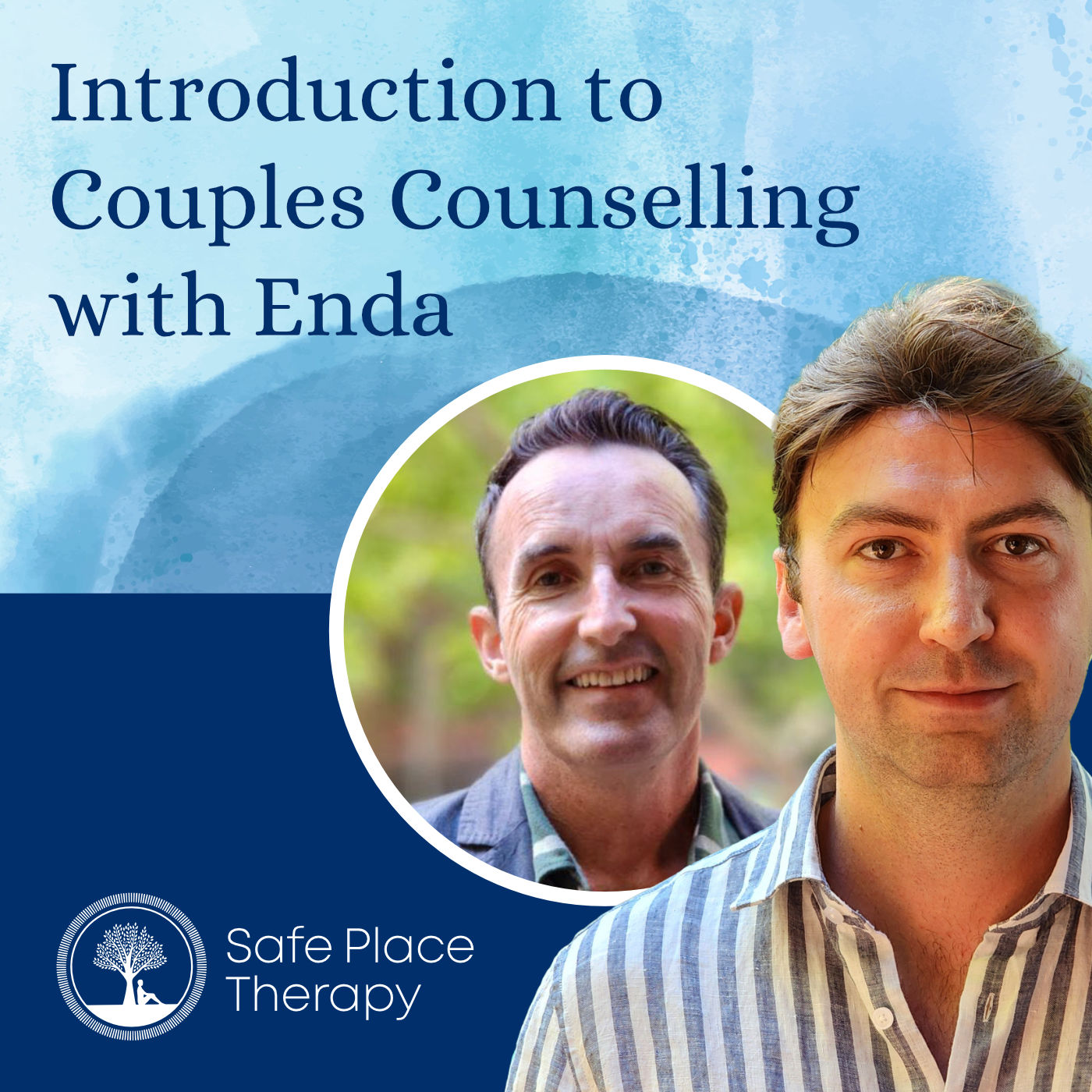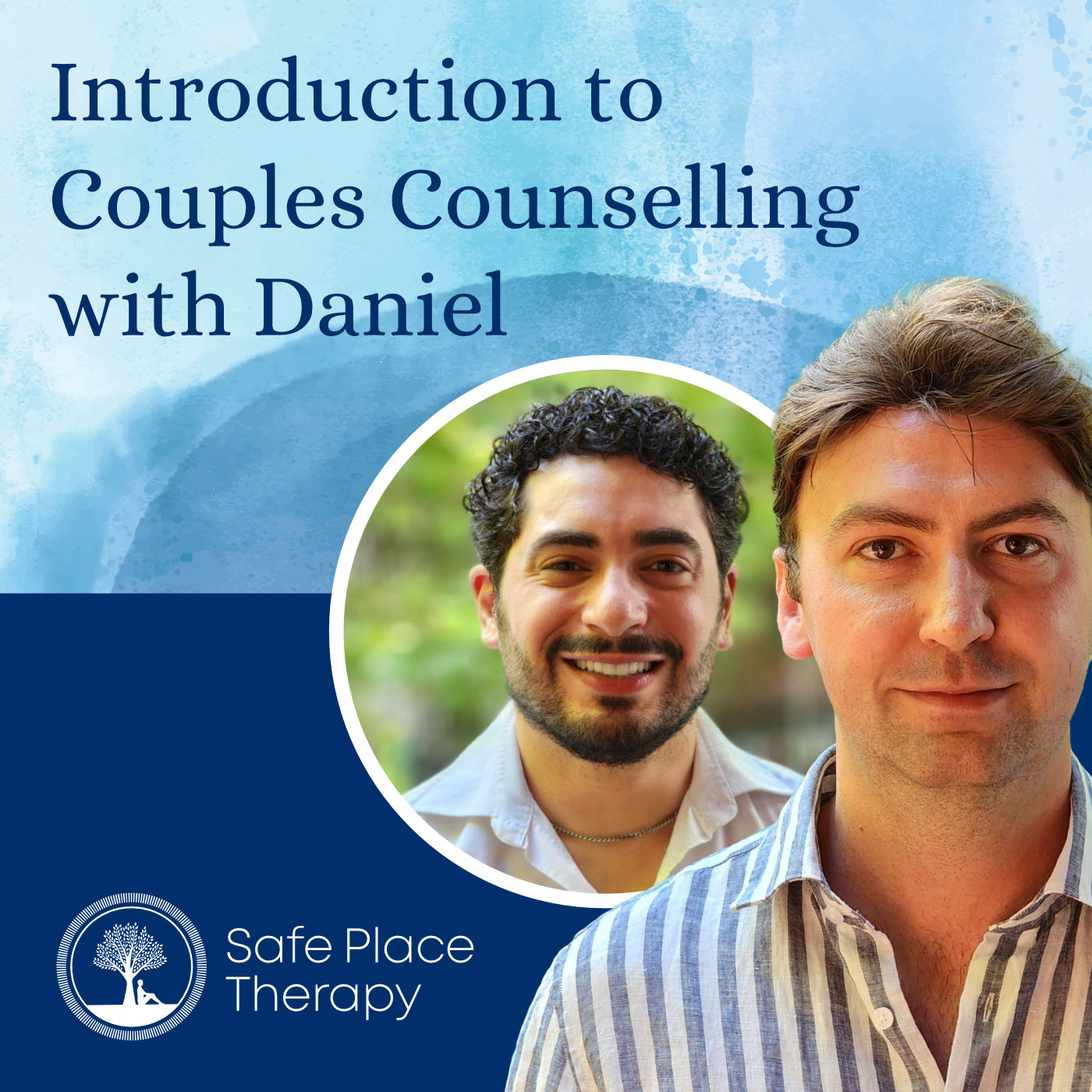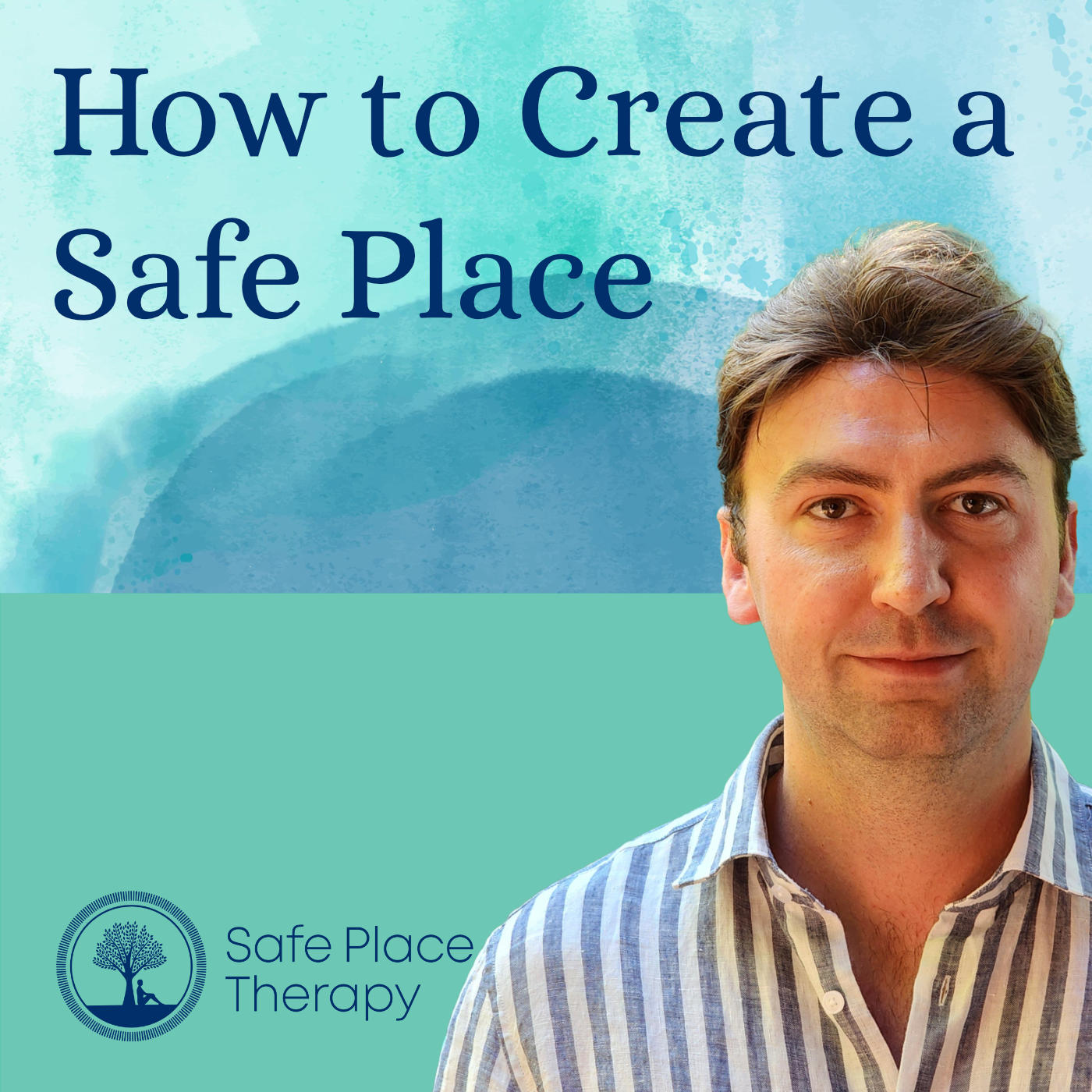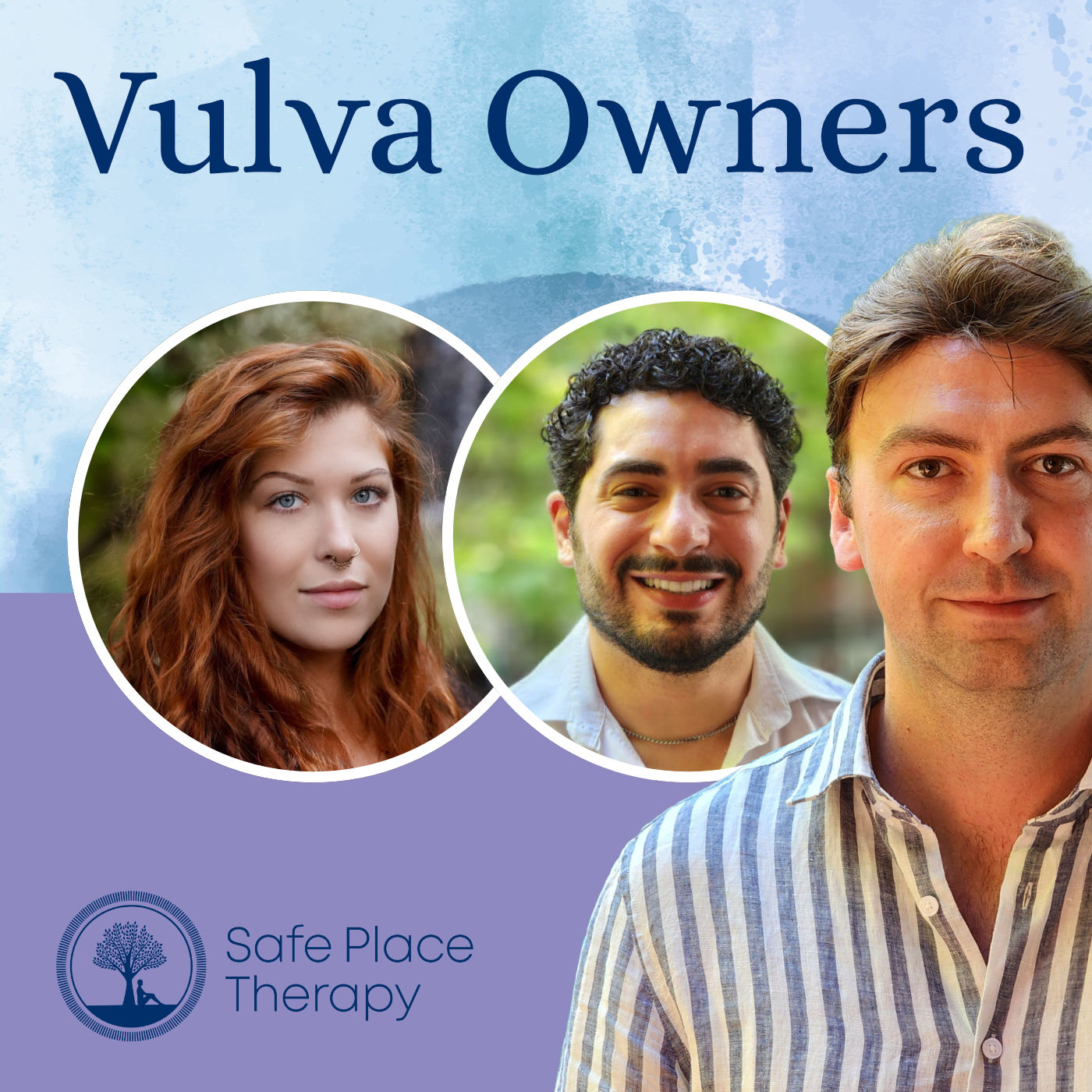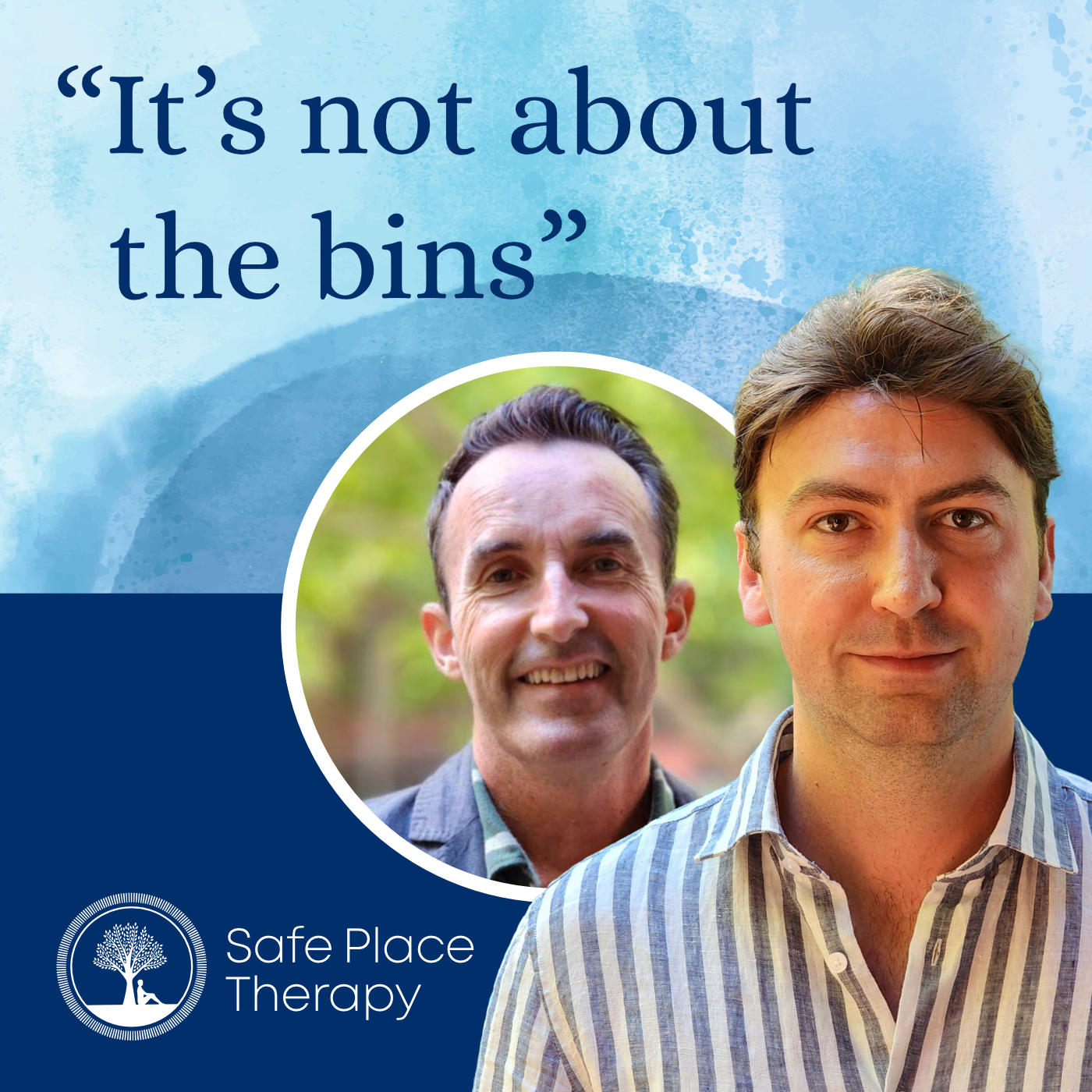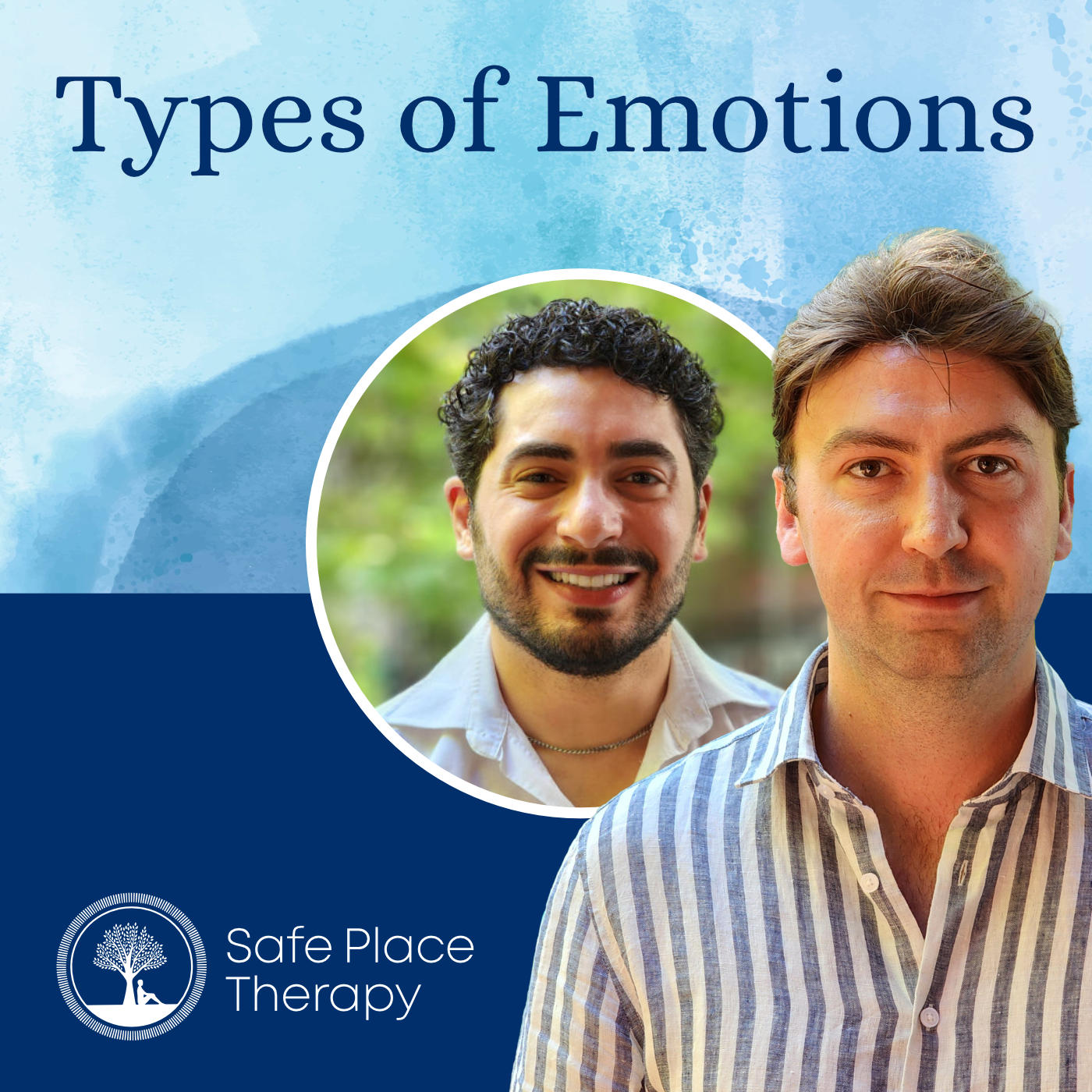Episode Transcript
[00:00:00] Speaker A: Foreign.
[00:00:06] Speaker B: Welcome to the Safe Place Therapy podcast channel. My name is Stuart Shevorden, and I am one of the owners and directors of Safe Place Therapy, and I'm a mental health social worker. I'd like to begin by acknowledging the traditional owners of the land in which we meet today. I would also like to pay my respects to elders past, present, and emerging. We record this episode on all our episodes in the Kulin Nation, but also on other beautiful lands across Victoria.
Welcome, everyone. We're doing a podcast today with Enda Doyle, who is a mental health social worker and actually one of our clinical leads with Safe Place Therapy. So thanks for joining us, Ender.
[00:00:50] Speaker A: Thanks, Stuart. Good to be here.
[00:00:52] Speaker B: Yeah. So today we're talking about couples. Work with yourself and what that looks like. Because with. With couples counseling or counseling in general, there can be a certain style, there can be a certain way that a counselor works. I think it's really good to spend some time knowing what that looks like with you. So when a couple does come and see you, Ender, what is it like? What is kind of the first session like with. With Ender?
[00:01:21] Speaker A: Yeah.
Well, first of all, I'd say most couples who come are going to be coming with a fairly high degree of apprehension about what's going to happen here.
They may or may not have experience, but either way, there's generally a good deal of apprehension and they've taken quite a big step to get here. So I'm very appreciative of that. So I want to put people at their ease as quickly as possible.
I want to make them feel very comfortable in the space and really safe to start communicating what has been going on. My main aim in the first session is to get a picture of what's been happening, what's led them here, what the main agendas may be.
I don't have a specific roadmap for first session, I do this. Second session, I do this. Some. Some forms of couple therapy will do that, and I draw on those forms. But I'd say for me, every new couple is an entirely new experience. So one of the things I'd say that sort of distinguishes my style of working with a couple is this is a new voyage. This is a new journey. I'm coming to it with a. A complete openness and curiosity.
Sure, there's lots of things I'll have seen before, and I'll drawing on my experience both in my own learnings and actually from my own life, from living this stuff.
But as to which particular tools and strategies I'm going to Start working with. I don't know that when a couple first walking, walks in because the scenarios are very different.
It's so varied.
What I'd like to get to by the end of the first session is that the couple feel a strong sense of hope that they didn't have an hour ago. That would be number one.
[00:03:18] Speaker B: Yeah.
[00:03:19] Speaker A: Excuse me. What I'd like to get to by the end of the first session is that both parties in the partnership walk away with a sense of really feeling heard and seen. That would be crucial for me, that each party must feel heard and seen and validated in whatever their particular statement, struggles and needs or difficulties and so on. Yeah.
I don't believe in instilling false sense of hope in people, but generally, if both parties are willing to work on it and work on themselves, I always see hope. I think really, the sky is the limit if both people are willing to work. So. Particularly if they're willing to work on themselves.
[00:04:00] Speaker B: Right. Yeah. Just going back to what you said before around creating that ease and a bit more comfort. What are some things that you try to do just in that first 10 minutes? What. What do you think kind of helps a couple, you know, settle into the session?
[00:04:16] Speaker A: Strange as it may seem, there's actually a lot of humor in my sessions.
People have commented on this that they weren't expecting to actually enjoy parts of the session. Yes, there's a lot of pain, There's a lot of heartache, but there's laughter, too. And I actually think starting to look at ourselves from a distance and look at just how unhelpful our sort of strategies have become in relationships in terms of trying to get our needs met, starting to step back from the relationship and sort of look at it from some distance, that's a lot of the work of couples counseling to step back and sort of look at it from a meta level. So in terms. Sorry, your question was putting people at ease. It's also.
There's often an expectation, I think, in people that one or both of them are going to be somehow blamed or judged for their behaviors, and that's simply not going to happen.
If that's coming across, then I'm not doing my job right.
Because basically, who am I to judge?
And to be quite honest, an awful lot of the behaviors and unhelpful strategies that couples are employing in relationships are familiar to me from my own life, you know, so it's. It would be very difficult for me to sit in judgment and point the finger at anybody. And if I found myself doing that I'm not doing my job. So in terms of making people feel at ease, I think the number one thing is not feeling judged.
Nobody is going to sit in front of me and feel that I'm sort of taking some kind of high moral ground and judging their actions, their failings, their weaknesses in relationships, because we all have them. We all have them.
And if that was coming across, then I would feel I was failing at my job. The reality is, when I'm working with couples, it's very easy.
It's very easy not to take sides. I think a lot of couples come in and they expect that the therapist will take sides with one or other person.
When we're sitting there, it very much feels like three people to me. If I'm working with a partnership, it feels like three people. And I tried to work like that. We are three people working on this relationship. Now, Yes, I come with a certain amount of expertise and experience, but we're three people. There are three minds at work here, and there are three people who have a major say in directing how we do our work, you know, and deciding what seems to be working, what doesn't, and what directions we should take and what we shouldn't. I'll come with my recommendations, but I'm very open to. You know, people are experts in their own lives.
[00:06:58] Speaker B: Yeah. So you're hinting there that you bring kind of your own personal input into the sessions. We don't kind of hear that a lot from. From professionals, from counselors is. Is they kind of remain distant or they remain separate. But you like to be part of it. You like to be engaged personally in it.
[00:07:21] Speaker A: It's very automatic for me, Stuart. I become involved with my couples. I think about them a lot when I'm not seeing them. I do a lot of work behind the scenes in thinking about what strategies and directions might work well for this couple. With many couples, I design specific exercises for them. So I love the creativity, that aspect of my work. And, yes, I bring a lot of my own lived experience to my work. I've been on the other side of the table, if you like. You know, I've attended couples counseling in the past in more than one relationship, so I've been on that side of the equation, too. I get it. A lot of the unhelpful moves, shall we say, that we all employ in relationships, And I say we all. It's very much a we. When I'm talking to a couple, it's not you two that do this. It's. This is what humans do in relationship. You know, this is what we do, especially in intimate long term relationships. These are the kind of things that manifest and come out and these are the sort of boxes that we lock ourselves in and we lock our partners in. So yes, I will out myself, Stuart, and say, I've been there, I've done that. There's not that much that's going to be said in a couple session with me where I haven't been on one side of that equation. Yeah. So I'm relating to it on a very personal level.
A lot of the lessons I've learned, I've lived and I've integrated, you know, my own learning from the best learning that's out there. I try to stay very current with people I respect in this area and the latest research on what's working, what's not working, and integrate the whole lot into, into my work. Yeah, right.
[00:09:08] Speaker B: Yeah. So I'm curious then, what, what are some issues that clients do come to you with? What are some of the, the hot topics that, that come to come to you in session?
[00:09:22] Speaker A: Yeah. As I say, every, every couple is different. And I don't like to have sort of preconceptions. When someone walks in, I go, oh yeah, I've got this, you know, because I think curiosity is something I really try to encourage in couples to have a curious attitude about your partner. But I try to live that too, to have a very curious attitude about the dynamic of the people who sit, who are sitting in front of me.
Hot topics. Look, I'll tell you, it's not that dramatic. But you know, obviously there are things like infidelity, excessive drug or alcohol use and so on. But the truth is, research would say that over 60% of partnerships end not because of the dramatic stuff, the fighting, but because of a gradual drifting apart.
[00:10:11] Speaker B: Yeah.
[00:10:12] Speaker A: And I'd say that's probably true with my clients. I'd say 60 to 70% of them will come in and say something like, it's not that we argue that frequently, it's not that anybody's doing anything terrible, but we've kind of become like housemates, you know. Very common if a couple have young children, actually. But it just seems to be very common somewhere between, let's say four years together and 10 years together that the fire goes, the passion goes, we stop really seeing each other. But we don't even know that we've done that.
[00:10:48] Speaker B: Yeah.
[00:10:49] Speaker A: One of the things I'm trying to help people do is to see the person again because we automate everything, don't we? It's like the classic example is driving a car. At first it takes all of your perceptions. You're aware of everything.
After a while, you do it without noticing you're doing it. We do that with our partners. We stop seeing them.
So that would be a very common scenario is simply people saying something like, we've become very different people.
There's a complete lack of intimacy. I shouldn't say a complete lack of intimacy.
There's a lack of intimacy. There's a lack of genuine curiosity. There's a lack of engagement with who each other are. And there's a real lack of evolution. This is a word I use a lot with couples. We have to evolve. The relationship has to evolve.
So you can have a relationship where it looks like you have it all. On the surface, everything's functioning. Two full time jobs, kids are doing well, but you don't have each other.
And that would be a common scenario.
Another common scenario, which I. You could think of it in terms of fight or flight. Really we go into fight or flight modes and a lot of what we're trying to do in couples work is to see those because often we don't know we're in them.
[00:12:10] Speaker B: Yeah.
[00:12:10] Speaker A: So to become conscious of them and then to get into healthier modes of being, what you might call wise mind or healthy adult modes of being. And there's many strategies for how to recognize when you're not in that and get to that.
[00:12:26] Speaker B: Yeah.
[00:12:28] Speaker A: So the other extreme, I guess on the fight or flight mode is couples that are fighting constantly and they cannot stop and they don't know what to do. And they don't like their own behavior. They're not proud of it, but they're stuck. They just don't know what to do. And again, there are fairly clear paths and strategies for getting to the heart of that and for changing habits. And it is possible.
[00:12:53] Speaker B: Great. So for you, it sounds like there's a real importance placed on the dynamics and the individual flavor of what's going on for that couple. How do you dig into that? How does Ender kind of pull apart the kind of relationship dynamics going on?
[00:13:18] Speaker A: Every couple has a sort of a dance. There's a choreography going on.
It's like a figure of eight. I move this way and I trigger you, so you move that way, which triggers me. So I move more this way, which triggers you to move more that way.
So I want to know when a couple sits down, I want to know what is the dance or what are the dances. There may be multiple.
So I want to Tease that apart. And I think it's something that couples can really get enthusiastic and excited about seeing. They go, oh, yeah, we do that. And it's so obvious when you step back from it and look at it from the outside. But when you're in it, it's very hard to see the wood for the trees. You know, it's like a fish. Fish in water sort of thing. What's water? You know, so. But for me, as an outsider who's experienced in seeing these patterns, it's finding the choreography. So what triggers you to go like this? Let's say to build a wall, to withdraw. What triggers you? What does the wall look like?
A lot of the time, we don't even know that we've erected a wall and that we're living firmly behind it. We don't know. And we think, what's our partner's problem? What's the problem? I'm right here. You can be right here, three feet away and be behind a thick brick wall, you know, and your partner is going crazy for lack of connection, you know, but they look like the bad guy because they're acting out, because they're maybe more of a pursuer. They're trying to get through. The higher the wall goes, the more frantically they try.
[00:14:53] Speaker B: Yeah.
[00:14:54] Speaker A: So part of what I'm doing is saying this is okay. Again, this is human behavior. This is humans in relationships. This is not YouTube being especially bad at relationships or especially damaged people. This is what we do when we get into long term intimate relationships.
[00:15:11] Speaker B: Yeah, yeah, yeah. And there's a. There's a point there that. That I think is really important for listeners to hear. That wall doesn't mean that person is an.
That wall doesn't mean that you're, you know, you're great cut out. Right.
[00:15:27] Speaker A: That's great.
[00:15:28] Speaker B: There is this kind of internal, maybe even unconscious, subconscious thing going on there that. That's hard to say.
[00:15:36] Speaker A: You're so right, Stuart. You're so right. I love that you say that. That wall doesn't mean the person is an equally. The person on the other side who is getting excited or even coming across as aggressive and endlessly needy. That doesn't mean they're not. So. To use the technical term. Yeah, but. But that brings up a very interesting point, is that we create our realities. We. I, behind my wall, come to the conclusion they're never happy. It doesn't matter what I do. If I do nine things right, they'll find the 10th thing that was wrong. That would be a classic thing, this. But I'VE invented that reality, Stuart.
But what I get from what you just said is we come to these conclusions. Their behavior means that they're a problem or they're unreasonable or I can't work with them or they don't love me or they don't see me, they're not interested and so on. We come to these conclusions in the space of half a second and it's generally done unconsciously. So what I really want to get through to couples pretty much from the start is let's not worry too much about the objective truth. It doesn't matter that much in relationship. You've got your truth, I've got mine, and they actually don't have to meet perfectly. What we have to do is be able to relate to each other. We have to realize that my truth is based on my perceptions, my vulnerabilities, my history, my anxieties, etc. I actually have a four step tool that I use specifically to go into this.
So the first part is simply what happened? Let's say my partner came home at 9 o'clock. They promised they'd be home at 8. I was waiting to go out. Okay. They didn't apologize.
Okay. That's what happened. Second step is what did I make up about that? And this is an important thing with couples. I'm constantly saying to them, and what did you make? Or what did your mind make up about it? Even better. Because I kind of want to separate the mind from the person.
[00:17:43] Speaker B: Yeah.
[00:17:44] Speaker A: So my mind might have decided that my partner doesn't respect me, doesn't care. Other things are always more important.
I didn't say anything because there's no point anymore. So that's what, that's the story I told myself. Then I go go into what feelings came with that feeling of alienation, disconnection, hopelessness, helplessness, anger, maybe.
And then lastly. And what would help, you know, what would help if you were speaking to your partner, what would help that situation? And we can go into that.
But one of the key things in that is I really want people to get the fact that we construct these realities and they become like certainties to us. And certainty is quite toxic in relationship. I guess the alternative is the other end of the spectrum is curiosity.
So it's all very well to think your partner is behaving selfishly and disrespectfully. That's great. But when you're sure of it, that's probably a problem.
So. And then we go into how to address these situations. Yeah.
[00:18:52] Speaker B: Because I think that's another thing that often couples need to hear is you as a therapist going, I actually think you both have good intentions here. Like, I actually think that you're sitting in this room, you're wanting to work on this, and there has to be some effort or there has to be some acknowledgement that you're taking some new steps, some different steps from the counseling.
[00:19:18] Speaker A: Yeah, you would.
It's sort of like essential if you're not willing to look at your own side of the street.
A question I would ask people, I go into values a lot with my work as being quite central.
If you are living according to your own values, what would that look like in a relationship? You know, and there are certain key values that I think are pretty much non negotiable in relationships. You, you got to be flexible, you got to be generous, you got to be kind. You actually have to be assertive. And we could talk more about assertiveness, because what I'm talking about is a very curious, compassionate sort of assertiveness. It's not laying down the law assertiveness.
You have to be open minded, you know? Now, I'm not saying any of us live up to these values 100% on any day. There's always more we could do. But I like to get people aligned with who do I want to be in my relationship, no matter what?
I think it's pretty easy to live up to your values on a really good day when everything's going your way. But who do I want to be when I'm feeling angry and hurt? Who do I want to be when I'm feeling taken for granted? What would that look like? How would I like to be described? So I have exercises too, around getting in touch with core values in relationships.
Getting couples to agree on values that they each want to work on and manifest more in their relationships.
[00:20:47] Speaker B: Right? Yeah. So it sounds then that, yes, you might have these. These unique dances or dynamics that couples go through that you need to really dig in and.
But then there's these broader tools that can often be used, you know, couple after couple. Like values like, like these tools that you bring in. Yeah. Okay.
So what's couples counseling like for you?
[00:21:16] Speaker A: It's a love, it's a vocation. I'm very, very passionate about it.
It's something I think about a lot when I'm not at work.
If you were to look at my bedside table, it's covered in books on couples counseling.
I have a friend who told me I need to diversify more. I said, it's okay. I go to the gym sometimes.
Yeah.
So it's. It's a passion. It's a passion.
You know, we all want to make a positive difference in the world, and I guess this is my way.
And so frequently with couples, there are children involved, there is the breaking of intergenerational patterns involved, and that comes into my work very much, because we can't quite make sense of who we are in a couple if we know nothing about what we grew up with, you know, and what we learned about relationships in our formative years.
So couples counseling, for me, it's a passion, it's a joy. There is a lot of pleasure and enjoyment working with couples. It's absolutely terrific to see changes, particularly if they happen fairly quickly. It's not uncommon that by a third session, couples are reporting major changes. Now, I think to sustain those changes, though, you need to maintain counseling. You really do. I do. I have. It has been suggested to me by one or two couples that I perhaps care more about their relationship than they do.
But for me, couples counseling, I work as an individual counselor also, and I love it. But there's a creativity in couples counseling that I particularly love because of this, these added complexities and dynamics of two people weaving in and out of each other.
And there can be even an urgency to couples counseling that often, by the time they get to me, it's make or break. You know, it wouldn't be uncommon for a couple to sit down and say, look, we're not even sure. We're not necessarily here to stay together. We're here to explore whether we should separate or stay together. And if we separate, we want to do it as amicably as possible. So that's fine.
But so I feel the consequences and outcomes if I do my job well can be just so meaningful and so life changing.
[00:23:49] Speaker B: So we do hear from different counselors having quite a specific approach in using one modality with a relationship issue. But I'm wondering, is there specific modalities you use ENDA or how do you work?
[00:24:06] Speaker A: I draw on a cluster of modalities.
As I was saying earlier, I really try to approach each couple as a fresh project. I love the creativity of couples work, of delving and exploring where we need to go and when we need to go there. So even the sequence, there might be certain points I want to hit with a couple generally, but the sequence of them may change for different couples depending on the urgency of the need when they get to me.
So to answer your question, I draw on several modalities. I. I love to study and read about my work. I'm constantly researching and training.
So I like to have all this.
I like to have available to me some of the best minds in my. In my view on the planet at the moment. So I try to stay very current with their work. I'm constantly drawing little pieces from here, there, and everywhere and thinking, ah, this would work for that couple, this would work for that couple. And then tailoring and creating maybe new exercises and strategies to use something like, let's say, schema mode therapy or acceptance and commitment therapy, or some of the Gottman research for a particular couple. But I think that is something that probably separates me from other therapists, is that I feel able to move fairly fluidly between different modalities, even during one session.
And I think my couples benefit a lot from that sort of flexibility, because I just don't really believe in a one size fits all approach with couples. It's too complex. It's very unique.
And I like to come at it more from a point of view of exploration, curiosity, and an experimentation. I mean, a lot of the time with couples, as with individuals in therapy, it's, try this, see how this works for you. Notice how it feels. Notice what happens. Come back to me, you know?
[00:26:13] Speaker B: Yeah.
[00:26:14] Speaker A: If any therapist is honest, I think they've got to talk about that. Every, every strategy and tool they will give a client or a couple. It's an experiment. Let's see what works. But if it doesn't work, we have more.
[00:26:27] Speaker B: Great. So it's the model fitting the couple rather than the couple fitting the model. And kind of.
[00:26:33] Speaker A: Yeah, yeah, well put. Yeah, yeah. You're more succinct than me, Stuart.
I wish I knew how to sum it up as easily as that. Yeah, but you're quite right. You're quite right.
And multiple models taking the best of different models for particular scenarios and time and place. You know, a model might suit one couple this week and not next week. You know, we got to go. Okay, we got to go to plan B or plan C right now, because since I saw you last, all sorts of unpredictable things have happened. So I want to be very adaptable and fluid, you know, And I think couples appreciate that, that they're being heard. Because if you're not, if you're imposing a framework on them, how well are you really hearing them, you know?
[00:27:21] Speaker B: Yeah, yeah.
[00:27:22] Speaker A: You know, I'm asking couples to be responsive rather than reactive. This is something if. If people come to me, they will have heard me saying, okay, so. So that's a reaction what would a response look like? You know, if theoretically, you could take 10 minutes to settle yourself and think about all the possibilities, interpretations, and then respond, what would that look like? So I tried to do that in my work. I try not to be reactive, but responsive. And I think to. To do that in the most optimal way involves being across many, many modalities of therapy. Many, many approaches.
[00:27:58] Speaker B: Yeah, really good segue there. We are going to put together a video based on fighting in a relationship and how counselors generally can kind of work with couples.
But what are some of the basic issues you see happening with a couple coming to you when. When they're fighting? What are some of the things you see there?
[00:28:23] Speaker A: Often there's a lot of. There's a lot of sadness underneath the fighting. When there's a lot of anger in a relationship, either from one party or both. One of the questions I want to get to fairly quickly, if anger is a recurring theme, one of the questions I want to get to fairly quickly will be something like, okay, and what's underneath the anger? What's underneath the anger?
Because more often than not, the anger is the tip of the iceberg, and it's the most accessible emotion. It's easily available for a lot of people. It's very, very habitual, and it can be ingrained going back decades. But what's underneath that and underneath it, what are the softer, more vulnerable emotions? Because underneath it, it can be feeling unloved, unsafe, rejected, taken for granted. When we can get into those feelings, we can start to make some fairly significant progress.
We have to get beneath the anger generally. Now, there is another side to that. There are people who need to learn how to stand up for themselves. And sometimes there are people who I want to help get in touch with their anger. Go, oh, if somebody was treating me like that, I think I'd feel pretty angry. How do you feel?
Some people, again, this goes way, way back. Generally, they don't give themselves permission to feel their anger and to express their anger. And one of the things we see in therapy, whether with individuals or couples, is suppressed anger can be very, very toxic. It comes out in other ways, comes out as depression. It comes out as drug or alcohol dependence, you name it.
So I want to work with the person who's in front of me. If the emotions tend to be big, expressive, assertive, or angry, I want them to try opposite behaviors. Try being vulnerable, try being hurt. There's a beautiful phrase. It comes from relational life therapy.
If you change your stance, you change the dance. I was talking earlier about the choreography. But if one person changes their stance, the whole dance has to change because you're. You're a system. You're a system.
You know, we want to get into being an us rather than a me and them, you know, so. So it depends on the person. Different strategies for different people. But generally challenging your current stance and trying something different, a sort of mantra I would ask people to really get into their heads is look for the understandable part so we can have blanket judgments. My partner is this, My partner is that. But if you really challenge yourself, look, you don't have to agree with them. You don't have to go, oh, you're right, I'm wrong. But you can generally find an understandable part.
You can generally find maybe underlying meanings in their behaviors if they are walled off or if they are continuously critical. Let's say, what's the underlying need there? What is the need there? What's the need with walls? Well, I guess protection. Okay, why would my partner need to protect themselves from me? What's that about? Again, approaching that, you know, from a point of view of curiosity. Genuine curiosity.
[00:31:44] Speaker B: Yeah.
[00:31:45] Speaker A: If they're coming across as critical, what does that mean?
Another voice I really love, and the contemporary conversation about couples as Esther Perel, she would say that under every criticism, there's a need. So get to the need, voice the need. Rather than you never. You always talk about the need. I feel unheard, I feel unloved, I feel unnoticed or whatever it may be.
[00:32:12] Speaker B: Yeah. The biggest thing I've taken away today is how nuanced relationship counseling needs to be. That there's this real dance, there's these real patterns, there's these real kind of specific things that you have to pick up as a counselor to, you know, build awareness, but also change that dance. So really, really insightful stuff there, Ender. So thank you for your time today. And. And if you are watching this and. And wanting some counseling support from Ender or any of our other team, please jump on our website, have a look at some other podcasts or videos, or reach out and make a time. Okay, thanks, everyone. Bye for now.
[00:32:53] Speaker A: Thanks so much, Stuart. Bye.
